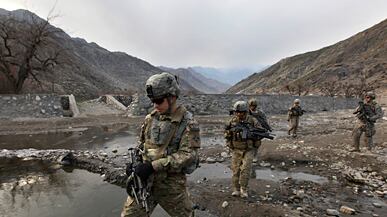After last Friday, it's fair to conclude that further major U.S. combat in Afghanistan makes no sense. Case in point: The U.S. military announcement carried in Friday's New York Times and Washington Post that American troops were withdrawing from an obscure valley it once termed "central" to the war effort. Vital yesterday, not today. Is it possible for anyone to figure out how to fight this war? Second case in point: Remarks on Friday to West Point cadets by Defense Secretary Robert Gates, including this bon mot: "In my opinion, any future defense secretary who advises the president to again send a big American land army into Asia or into the Middle East or Africa should ‘have his head examined,' as General MacArthur so delicately put it." Folks, he was referring to Libya, Iraq, and Afghanistan. So, if it doesn't make sense to fight in Afghanistan tomorrow, why do it now? Though Gates said little more about Afghanistan, this quote alone about future military sanity should occasion serious debate about this long war.

The news stories contain virtually equal dynamite, but have been obscured by the scary Middle East upheavals—and they have to be read as carefully as they were written. The Times story opened deadpan, pointing out that U.S. commanders in Afghanistan are taking troops out of the Pech valley in eastern Afghanistan not far from the border with Pakistan—a location they once termed "central" to the war effort. Now, apparently, it was no longer "central" or "vital." Now, despite the many lives and limbs lost in years of fierce battle there, it was no longer strategically worth continued American losses. It once was; it isn't now. May those who fell there rest in peace.
Now, the commanders determined, U.S. troops in that desolate place would better serve the overall campaign elsewhere—protecting population areas instead of defending against remote Taliban operations.
The inescapable point of these news stories is that the U.S. military doesn't know how to judge what's vital inside Afghanistan and what's not.
Now, as both news stories made clear, the commanders did not claim "mission accomplished" in Pech because the mission was NOT accomplished. The Taliban continue to operate effectively in the area. Both stories also noted that Afghan forces would be replacing the American battalion of 800. But, of course, no one would venture even to hint that they could or would fight effectively or for very long. The conclusion seems inescapable: Deploying that U.S. brigade into Pech in the first place was a military miscalculation, and the losses, a mistake. But judge for yourself as you listen to the explanations in the Times by U.S. commanders. "After years of fighting for control of a prominent valley in the rugged mountains of eastern Afghanistan," the Times account begins, "the United States military has begun to pull back most of its forces from ground it once insisted was central to the campaign against the Taliban and Al Qaeda."
Of course, U.S. commanders worry that the troops who served in Pech will conclude that their sacrifices were in vain. Over 100 U.S. troops died in that impossible terrain. But, says regional commander General John F. Campbell, "I prefer to look at [the withdrawal of U.S. forces from Pech] as realigning to provide better security for the Afghan people." He added: "I don't want the impression we're abandoning the Pech." Surely, no one could be so misguided as to think that. Alas, as the Times and Post pieces continued, there are questions about whether the original strategy to deploy the troops to Pech made any sense to begin with. In the beginning, at the outset, the big military thinkers thought it best to deny sanctuaries to the Taliban, protect U.S. supply lines from Pakistan, and use full NATO firepower that couldn't be used in cities. Now, they don't think that about fighting in those impossible valleys. Good thinking, finally.
In the Times account, General Campbell punctuated the point for exiting the Pech. "There are thousands of isolated mountainous valleys throughout Afghanistan." Yes indeed: thousands, we must have discovered recently. Now, drink in this one last psychedelic quote by a "military official" too smart to let the Times use his name: "What we figured out is that people in the Pech really aren't anti-U.S. or anti-anything; they just want to be left alone," said one American military official familiar with the decision. "Our presence is what's destabilizing this area." Did you hear those words? The Afghan people in the Pech "just want to be left alone." It really isn't the horrid Taliban (and they are horrid) who live there who are the main problem. "Our presence is what's destabilizing this area." Think about it again! I'm not blaming the generals or their key aides who made these strategies. They were all sent to Afghanistan to do their duty for our country as Presidents George W. Bush and Barack Obama decreed. They were given a task to pacify an Afghanistan that we could not pacify, to prepare Afghans to govern and fight for themselves who turned out to be unwilling to fairly govern or effectively fight. The generals and their aides were given the task of searching for answers, for workable strategies, that didn't exist.
Thus, what was "vital" one day, was not the next. Thus, precious lives were lost and squandered doing their duty. May they rest in peace. The inescapable point of these news stories is that the U.S. military doesn't know how to judge what's vital inside Afghanistan and what's not. And the message from the Gates speech is that Afghanistan itself is not worth the horrendous cost. With such profound doubt and misgivings, it's time to move almost all U.S. and NATO forces out as quickly as possible and restrict operations mainly to helping friendly Afghans fight their own war.
All those Americans and allies who served in this war are true heroes. But we do not honor these heroes by making more American and allied heroes in Afghanistan, whether in the Pech or in the cities. Enough heroes there.
Leslie H. Gelb, a former New York Times columnist and senior government official, is author of Power Rules: How Common Sense Can Rescue American Foreign Policy (HarperCollins 2009), a book that shows how to think about and use power in the 21st century. He is president emeritus of the Council on Foreign Relations.






